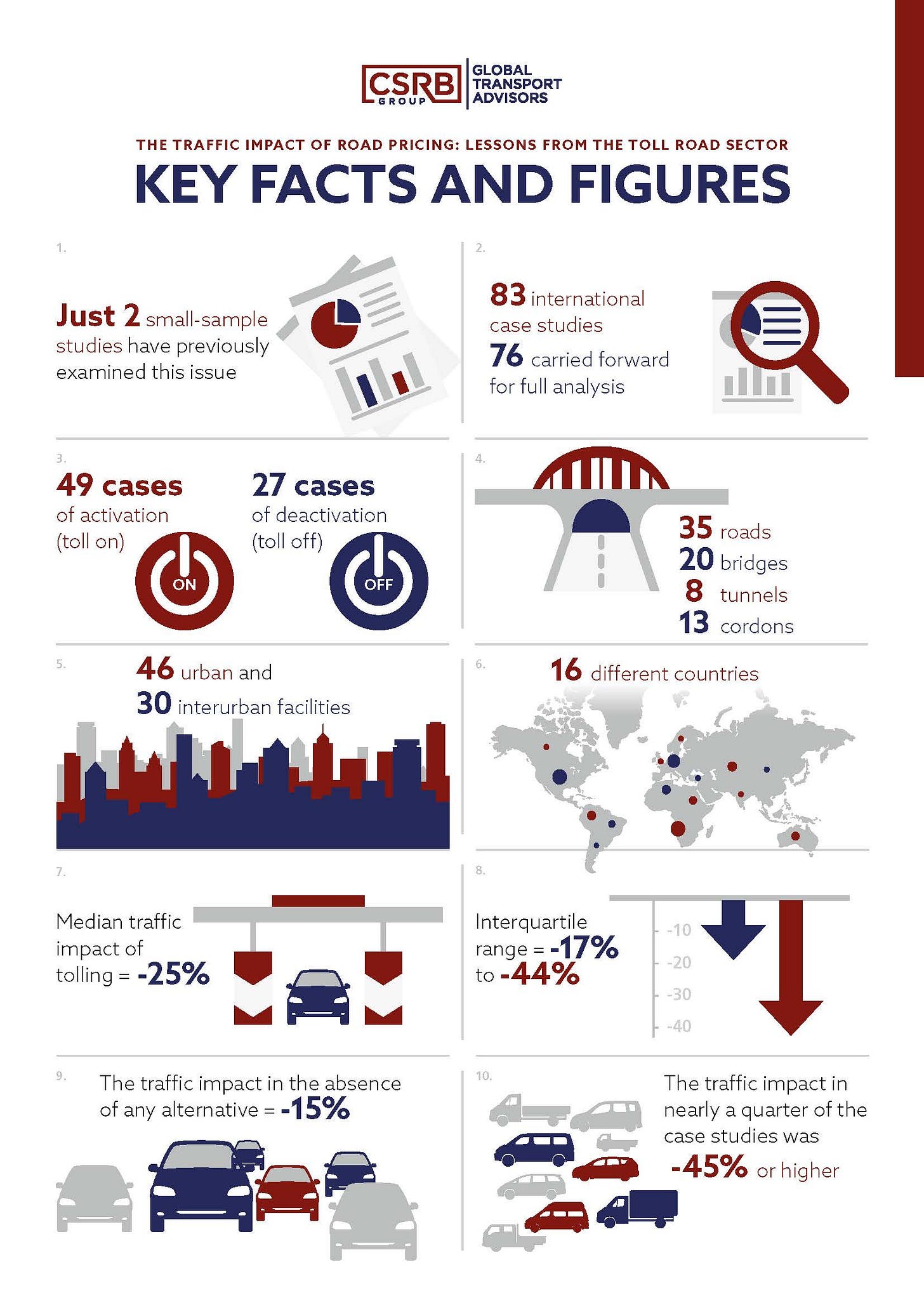What happens when roads aren't free?
New research shows large traffic impacts from road pricing
A bit of a different tune this week - I’ll be discussing some recently published professional research. It’s called the “Traffic Impact of Road Pricing: Lessons from the Toll Road Sector”
A few weeks ago, Toronto’s director of traffic management stepped on a traffic management rake. For political reasons (people hate tolls), the director had to justify why Toronto would not charge drivers to use its congested streets.
At the end of the day, it doesn’t matter how much you charge. If you’re going to take an approach of drawing a box around the city and then imposing that sort of charge, anyone that has to do business or anyone that has to bring goods or services into the city, they still have to do that. They would just pass that charge onto the consumer,” he explained.
He also added that the traffic management strategy was “not about making cars disappear”.
How to Make Cars Disappear
Ironically, that’s basically the research question a colleague and I have worked on for the past year. Until now, there have only been small-scale studies on what happens when roads start being priced. With a lack of data comes a lack of good sense, so we set out to scour our records, government reports, and the internet to find any and all cases we could of what happens when roads start being priced1.
In all, we collected 76 data points, including 35 roads, 20 bridges, 8 tunnels, and 13 cordons (areas) across 16 countries. Across the sample, on average 25% of vehicles did disappear when tolling started2. The interquartile range was between 17% and 44% reductions in traffic. That’s a wide range!
For our clients who invest in toll roads, that might be a worrisome risk (occasionally, investors are asked to bid on existing roads before tolling has started - putting this initial traffic response risk on the investor). But from a traffic management perspective, this is a strong demonstration of the power of road pricing to reduce congestion and save everyone time.
Some might say, “but the drivers will just change to local streets”, and it’s partially true - shifting routes can be a big source of the traffic lost due to tolling. Roads with good alternatives lose more traffic when tolled - our analysis suggest roads with alternatives can be expected to lose 20% more traffic than roads without alternatives (though that also depends on its quality and reliability). That’s a good reason to implement “cordon” schemes that you can’t “rat-run” around. We have cordon cases in our dataset, and they show traffic impacts as well3. We also found 8 cases of bridges and tunnels where there is no viable alternative (i.e. more than an hour detour). Even in those cases, pricing consistently caused traffic to be 10-20% lower than otherwise.
In these cases without alternatives, the only way to have less traffic is from trip suppression. It doesn’t need to be dramatic reshaping of travel patterns, it can be as simple as going to the dentist and picking up groceries in one trip instead of two. But it’s meaningful - because traffic congestion increases exponentially as roads approach capacity. If a road is very congested at 100 cars, dropping it to 85 cars will eliminate most of the congestion.
It’s also worth highlighting that the large initial traffic responses are a bit surprising. Generally, existing toll roads show inelastic demand - increases in tolls do not produce large responses in traffic. But there does appear to be something special about going from free to priced in getting drivers to respond. Or in reverse, there is something about the “freeness” of roads that encourage buffet-style gorging. Every time I’m stuck in traffic, I wonder how many of the other drivers are not willing to pay ~anything~ to go where they’re going, and whether the congestion caused by that is worth wasting everyone’s time.
Finally, some local implications for Halifax. If you think traffic on the bridges is bad already, removing the tolls, and the expected ensuing 10-20% traffic increase would make it considerably worse. On the flip side - how much of the traffic problems along the Bedford Highway, or Armdale roundabout, could be effectively solved by even a modest toll? As a peninsula, Halifax is an easy place to establish a cordon scheme (see here).
An infographic showing the highlights of our research below:
To extend the data set we also included cases where tolling ended, Like Port Mann and Golden Ears bridge in B.C. - and measured the increased in traffic, so the inverse
From the tolled road
But also, a third of them are from Norway where (apparently) the cities didn’t even intend on cutting traffic, they just wanted to raise some money in some broad way








Very interesting topic and thoughts. The congestion in Halifax has me refusing to drive there.
Now the Tories have promised to eliminate bridge tolls. My prediction: this will render the bridges almost useless due to additional congestion. Why not eliminate transit fares instead?